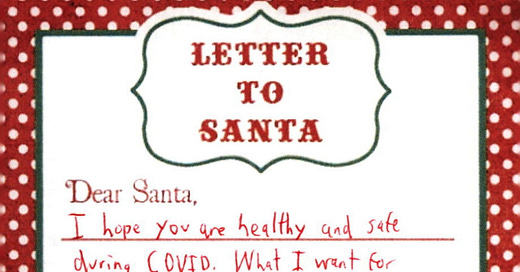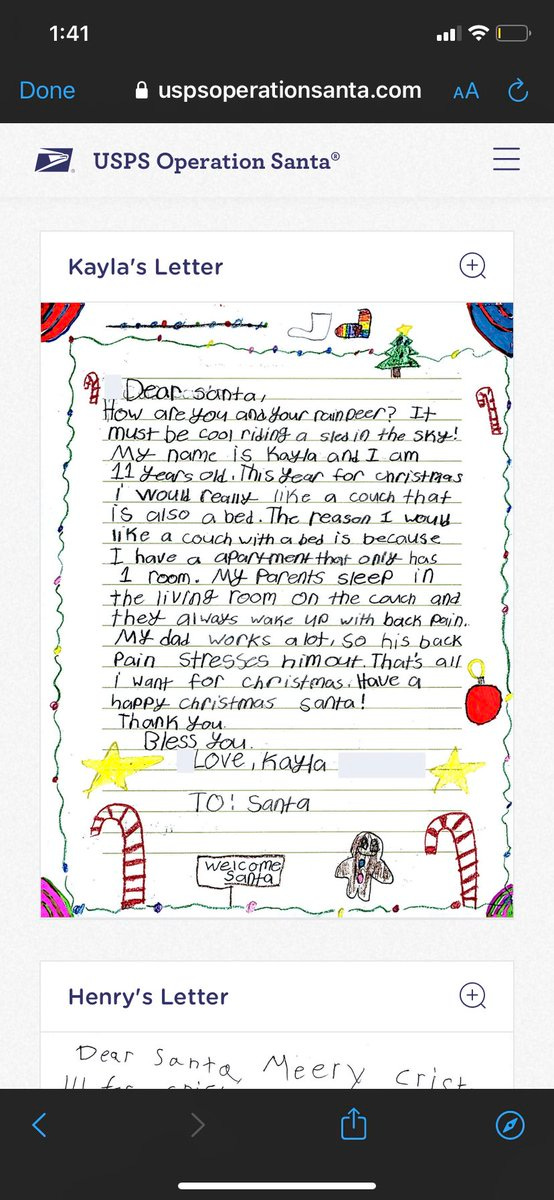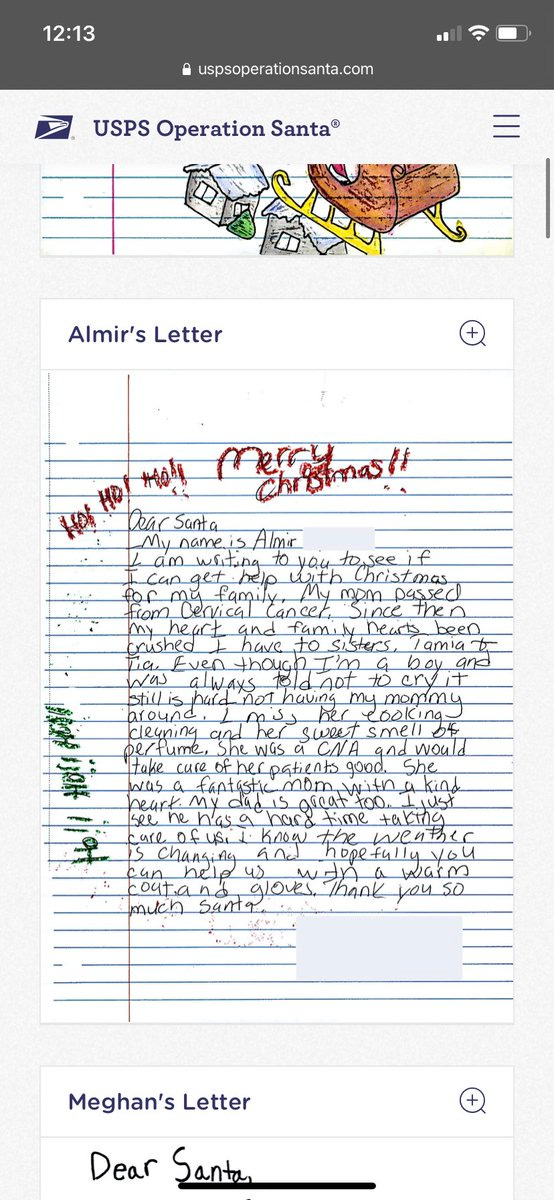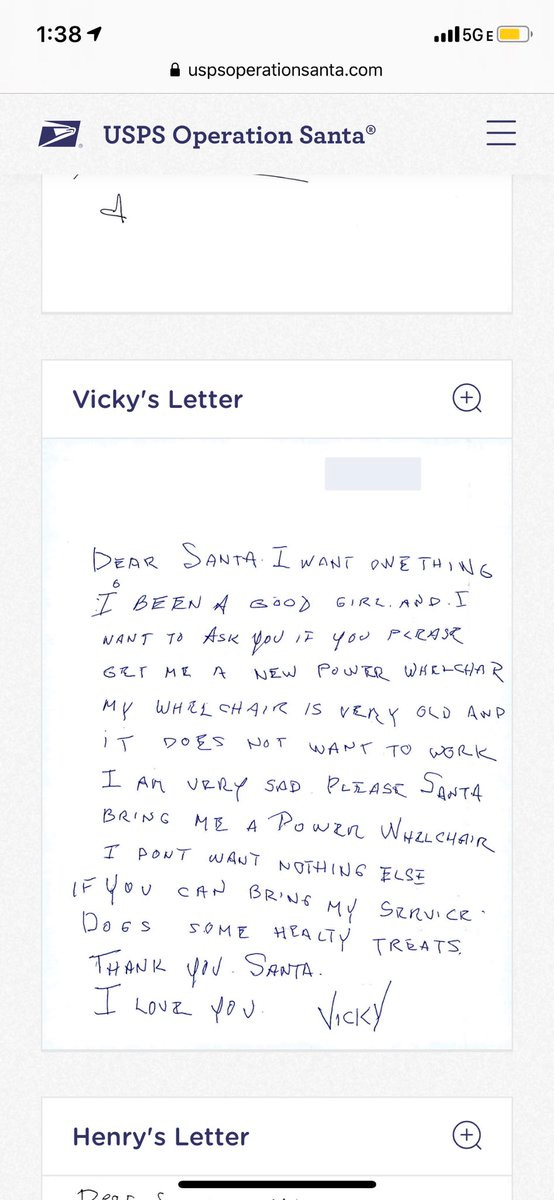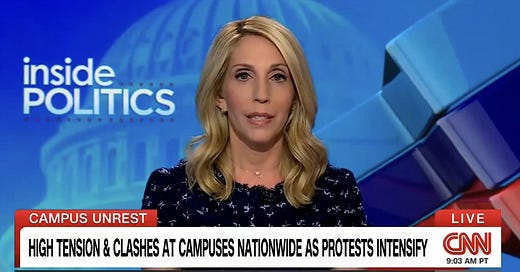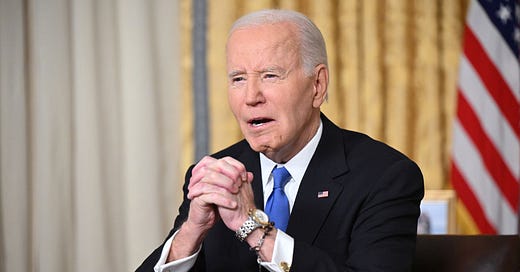
Operation Santa: Pandemic Edition Is as Depressing as It Sounds
The bleakness at the heart of the USPS program is especially pronounced this year.
A couple of years ago, I contributed to a group gift for USPS Operation Santa, the annual charity endeavor hosted by the U.S. Postal Service. As the tradition goes, children write their letters to Santa about what they want for Christmas, and send them via USPS. From there, the postal service makes these letters available for fulfillment by charities and corporations. The operation went digital in New York in 2017, and last year it expanded nationwide, allowing anyone to "adopt" a child's letter and send them their gift.
The group gift was with Splinter, actually. It was my first week on the job and Hamilton (of Nolan fame) had suggested that the team take one of the letters and give to the kid. From what I remember, it was written by a little boy, who wanted several blankets for him and his parents and siblings, and then a game console. I think Hamilton bought the console, someone else got the blankets on Amazon, and then we split the cost evenly. They wrapped them the following week, when all the other remote staffers were in the office, and shipped it off. Thanks to the horrifying contraption that is Venmo, I have easily checked that the split was $22.00.
At the time of the gift, I didn't think much of the setup itself — that kids who might not get a gift from their family get a chance to have their wish fulfilled by a kind stranger, or a team of bloggers, instead. Nothing struck me as so totally off, because a program like this felt inherently good, and I had done gift drives like this before. In the Girl Scouts program we'd do "Blue Santa"-type volunteer opportunities, like going to a gift collection center and taking the wish lists and going "shopping" through all the toys to fill boxes with what kids wanted. I wasn't thinking about the implications of what it meant that parents didn't have money for toys, because it was something I had experience with myself, and it just felt like this was the way things were. My focus was so much on helping individuals that I wasn't thinking about razing systems that benefit from this disparity.
To be clear: Operation Santa is nice! Helping people is good. Giving children gifts is good. But at the end of the day, Operation Santa exists because we live in a world where some people never have to think about presents and other people worry that they will never get anything nice unless they write to the Post Office and get chosen.
You understand this more when you read the Operation Santa letters themselves. Many of them are scribbled, wonkily-aligned lists of names of unfamiliar toy brands. But when you actually read the letters with substance, you start to get a much more thorough picture of just how incredibly burdened a lot of these children are. How much their wishes are focused on their families and what they need the most, and trying to justify why they're deserving of the basic necessities that everyone deserves. Take these screenshots of previous Operation Santa letters that were tweeted out by a grad student in Canada last week.
You can open the tweet yourself, but here's a few excerpts from these letters to Santa:
... My name is Kayla and I am 11 years old. This year for Christmas I would really like a couch that is also a bed. The reason I would like a couch with a bed is because I have a apartment that only has 1 room. My parents sleep in the living room on the couch and they always wake up with back pain. My dad works a lot, so his back pain stresses him out...
... I want to ask you if you please get me a new power whelchar my whelchair is very old and it does not want to work I am very sad please Santa bring me a power whelchair I don't want nothing else ...
... My name is Julian. I am 10 years old. My wish is money for my perents $100 would help us a lot. They'are having a rough time with the bills!...
... I am writing to you to see if I can get help with Christmas for my family. My mom passed from cervical cancer. Since then my heart and family hearts been crushed I have to sisters, Tamia + Tia. Even though I'm a boy and was always told not to cry it still is hard not having my mommy around ... My dad is great too. I just see he has a hard time taking care of us. I know the weather is changing and hopefully you can help us with a warm coat and gloves ...
Feel fucked up about it yet? No? Well, here are several other letters that might just do the trick! This year's Operation Santa began on Friday, Dec. 4, and fuck do they do just make you feel the gravity of our current situation. As many of these letters reference, finances are all the more strained during this pandemic, when so many people have died, and state and federal governments could have kept kids and their families safe with relief funding, but didn't.
The letters come from parents writing for their children, but they also write requests for themselves. You can filter the letters by type of gift, and state, and number of kids in a family, but there are also the "special requests." So far, I've read from a mom asking for a used minivan, because she's put a lot of money toward specialists and tutors for one of her children, who is on the autism spectrum, and she also lost her income during the pandemic, and a dad whose significant other left him and their children because he lost his job as a result of COVID. The special requests from parents asking for financial help are sandwiched between letters from children asking for live pets, or motorized bikes, or guns, but many of these things are not like the others.
Here are a few other letters that struck me:
From Jasmin, in California:
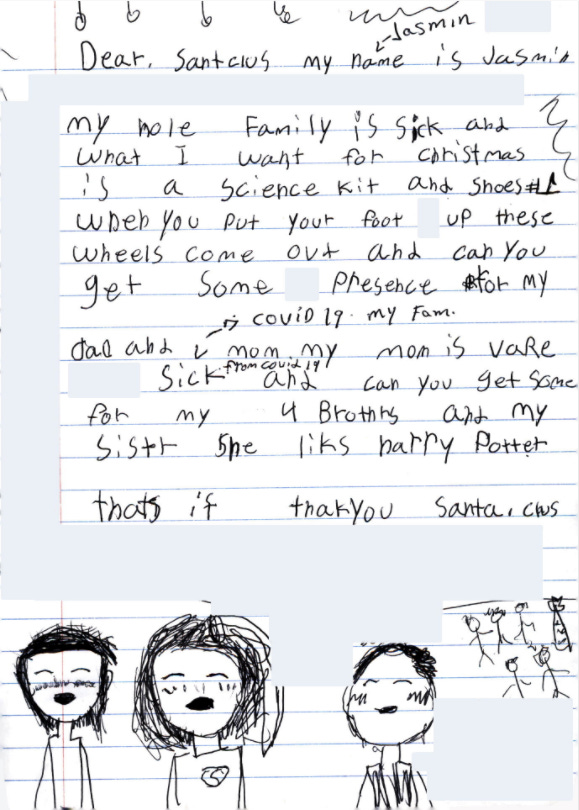
From Franchesca, a single parent, in Massachusetts:
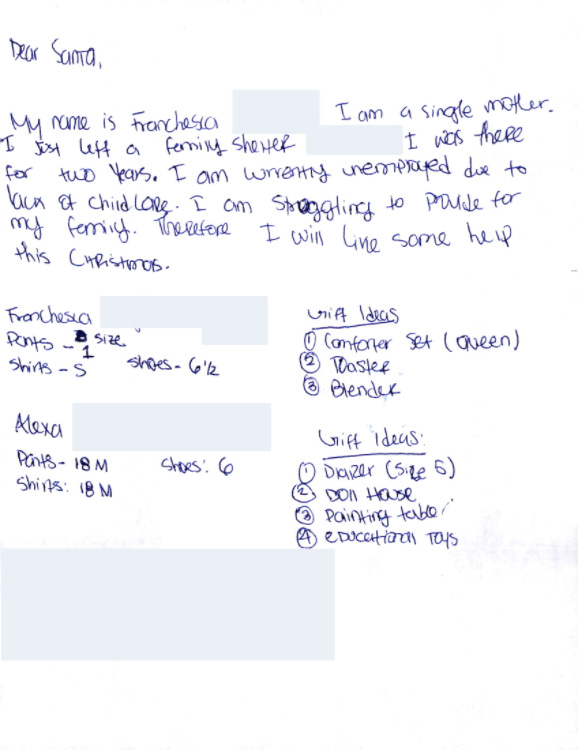
From Sara, 16, in Pennsylvania:
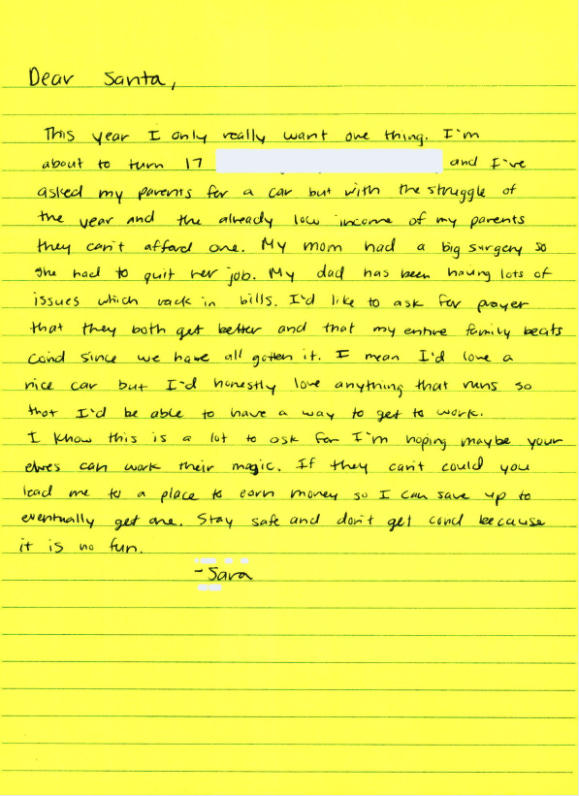
From Kimberly, 13, in Texas:
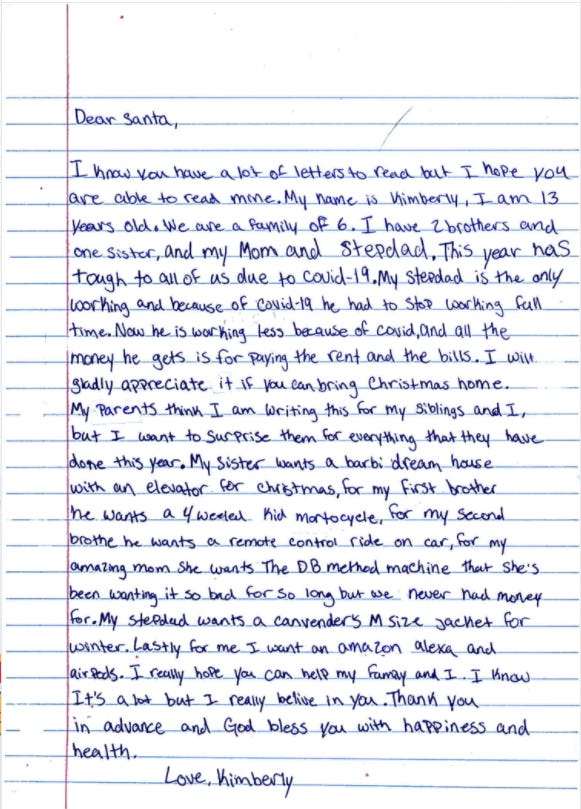
The situations these kids and parents describe are heartbreaking, but it's all the more infuriating that these children are having to be worried in the first place. In a better world, our governments would have taken care of their people, and kept them healthy and safe and resourced to slow the spread of COVID, and would have been giving people the things they need long before the pandemic began. Kids wouldn't have to worry about their working parents getting sick, or losing their jobs, or the financial implications of what that will mean for their family's future. But this is not how the United States operates, even during a pandemic. Poverty is profitable, and the people and systems that make a profit off of poverty have no incentive to even humor the idea that a different world could exist. So here we are.
A lot of these details from the kids' letters remind me of the despair I felt as a child, desperate to be the savior of my family's financial woes. I don't remember what set it off (I suspect living among the children of Dell Computer engineers had something to do with it) but I have so many distinct memories, spanning years and years, of feeling like I was under some pressure to perform well, in school and at home, because of money problems.
For most of my childhood I wanted to become a doctor, because I knew doctors earned a lot of money. I felt guilty when my dad had to take time off of work to pick me up from school because I was sick, and cried the time I thought I broke my arm, because I was thinking about how expensive the hospital bill would be for them. I recall in 4th grade writing severely depressed thoughts about this pressure I felt in my notebook during "writing time," and freaking out after I realized that math didn't come easy to me.
I look back, and see how my parents provided for me to go to college because of the frugality, and the penny pinching, and my dad eventually moving into a higher-paying, riskier trade. It all turned out better than I could have expected. But for years, things felt far from OK, and as a child I had no way to know that these weren't things that I could help, nor that they were consequences of systems that were far out of my parents' controls. And so feeling these obligations were just what made sense in my little kid brain: I had to be a good kid because we didn't have much money and my parents worked all the time and seem really stressed and why should I add anything to their burden and at least if I become a doctor I can earn a lot of money and make things better for them?
I don't recall ever writing these feelings into my post office letters to Santa — that bubble popped early for me. But I wonder what might have happened to those earlier letters, if any of those had ever gotten sent off, and if so, if anything ever came from it. This is all to say that of course people should want to adopt one of these letters and make these kids feel special and like their family's financial stress didn't completely overtake this year of their lives, which, if you can recall your own life as a kid, I'm sure felt like an entire lifetime in its own. Again, the database of letters is now open, and the last day to ship off presents to the USPS is Dec. 19. They even have an option for team adoptions, which I'm sure appeal greatly to remote staffs working from home and feeling guilty about it (Discourse Blog overwhelmingly included).
But Operation Santa is just one of the many programs that, in a better world, shouldn't have to exist. I think when you're in the "giving spirit" and just want to "put a smile on a child's face" or experiencing whatever other cliché people love to say about charity work, it's easy to forget that things shouldn't have to be this way. That our participation in these programs isn't heartwarming — and really, heartwarming for who? — but a result of these societal failures that make kids feel like it's up to them to save the spirit of Christmas.


